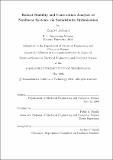Robust stability and contraction analysis of nonlinear systems via semidefinite optimization
Author(s)
Aylward, Erin M
DownloadFull printable version (660.1Kb)
Other Contributors
Massachusetts Institute of Technology. Dept. of Electrical Engineering and Computer Science.
Advisor
Pablo A. Parrilo.
Terms of use
Metadata
Show full item recordAbstract
A wide variety of stability and performance problems for linear and certain classes of nonlinear dynamical systems can be formulated as convex optimization problems involving linear matrix inequalities (LMIs). These formulations can be solved numerically with computationally-effcient interior-point methods. Many of the first LMI-based stability formulations applied to linear systems and the class of nonlinear systems representable as an interconnection of a linear system with bounded uncertainty blocks. Recently, stability and performance analyses of more general nonlinear deterministic systems, namely those with polynomial or rational dynamics, have been converted into an LMI framework using sum of squares (SOS) programming. SOS programming combines elements of computational algebra and convex optimization to provide e±cient convex relaxations for various computationally-hard problems. In this thesis we extend the class of systems that can be analyzed with LMI-based methods. (cont.) We show how to analyze the robust stability properties of uncertain non-linear systems with polynomial or rational dynamics, as well as a class of systems with external inputs, via contraction analysis and SOS programming. Specifically, we show how contraction analysis, a stability theory for nonlinear dynamical systems in which stability is designed incrementally between two arbitrary trajectories via a contraction metric, provides a useful framework for analyzing the stability of uncertain systems. Then, using SOS programming we develop an algorithmic method to search for contraction metrics for these systems. The search process is made computationally tractable by relaxing matrix deniteness constraints, the feasibility of which indicates the existence of a contraction metric, to SOS constraints on polynomial matrices. We illustrate our results through examples from the literature and show how our contraction-based approach offers advantages when compared with traditional Lyapunov analysis.
Description
Thesis (S.M.)--Massachusetts Institute of Technology, Dept. of Electrical Engineering and Computer Science, 2006. This electronic version was submitted by the student author. The certified thesis is available in the Institute Archives and Special Collections. Includes bibliographical references (p. 107-110).
Date issued
2006Department
Massachusetts Institute of Technology. Department of Electrical Engineering and Computer SciencePublisher
Massachusetts Institute of Technology
Keywords
Electrical Engineering and Computer Science.